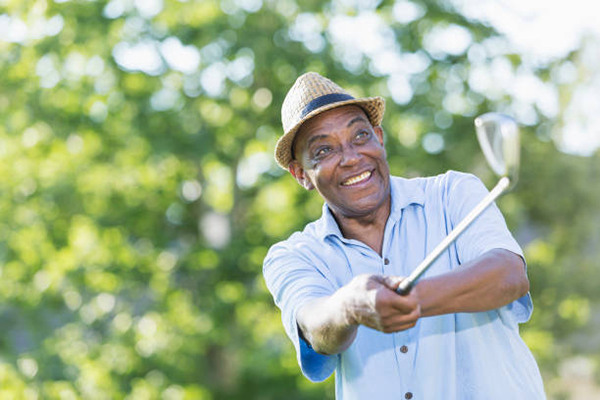
March 2, 2021 | BY AAGD STAFF
An interesting fact that many may not know about people who play golf is that they have greater muscle strength, flexibility, endurance, and balance than others in their age group who don’t play the sport.
Along with these physical benefits, there is also the fact that an individual’s mental health seems to improve along with improving mood and self-esteem. There are also the socialization factors involved with exercising with friends, enjoy camaraderie while developing old and new friendships.
Carlton Minor, a 75-year old living in Frisco, Texas says that after a round of golf with friends “I enjoy being outdoors, the fresh air and sunshine makes me feel energized. My mind gets clear of any stress I’ve been carrying around and, I love spending time with my friends.” Minor, a former architect who retired years ago, still consults with clients. “I’d rather be out here on the golf course laughing and joking with my buddies, and trying to get my single-digit handicap back,” he chuckled
Selena James, an “age seasoned” fully retired, Brooklyn, NY resident says, “Playing golf provides me with a menu of benefits. The low physical impact sport gets me out to play in the fresh air and sunshine, with the benefit of social interaction while exercising my brain and having fun at the same time!” James, who worked as a Registered Dental Hygienist and Professor, Emeritus at Hostos Community College/City University of New York (CUNY), started playing golf by taking her first swing in 2007 and joining on an inaugural trip to Ghana, West Africa with the African American Golfer’s Digest.
LOWER RISK OF DEATH
In February 2020, the American Stroke Association (ASA) presented research at their International Stroke Conference that showed that older adults who played golf at least once a month had a lower risk of death.
Mariam Saunders, a 67-year-old, former international banking Vice President says, “I just took up the game since the coronavirus hit. I love walking and the game is perfect for getting my miles in.” The newbie golfer took lessons (at a distance) with the club pro in her Orlando, Fla., backyard, last year when the coronavirus was at an all-time high there. “I’m not the best I can be at this sport yet, but my legs—and my whole body—get great exercise, and my strength is improved.”
For a decade during the ASA study, researchers tracked close to 5,900 adults aged 65 and up, and discovered, of the individuals who golfed regularly (playing at least once a month) their chance of dying from any cause was eight percent less likely than non-golfers.
“What better way of staying in tip-top shape than playing a round of golf,” claims Avery Becton who’s been playing for 15-years. The Senior Contracting Officer resides in Manassas, VA, and admits, “Not only is it fun and adventurous, but I also get great joy in knowing the healthy and physical benefits of playing the game. Although golf is a low-impact workout, it helps build and strengthen my muscles and increases my mobility and stamina.” Becton says that he finds golfing to be a great way to improve his cardiovascular functions and blood flow. “Finally, golf helps improve my concentration, problems solving/decision-making skills and challenges my mental capacity. I believe this ultimately help reduce the risk of dementia or other type cognitive problems—Yes, golf is a great way to live a healthy and enjoyable lifestyle.”
GREATER EMOTIONAL WELL-BEING
Neurologists have reported that there are several reasons why golf might have such a positive health impact on elderly people. First, golfers enjoy greater emotional well-being than people who do not play the game, due to the social interaction and the relaxing outdoor environment. Second, it’s a great way to stay fit, while engaging in a low-intensity activity that is not as strenuous as many other sports.
Barbara Proctor, a resident in Houston, Tx., who has played for over two decades thanks golf for keeping her sane during Covid-19. “I hated being copped up in my house 7-days a week. Golf gave me an opportunity to get out, stretch my legs and arms, and strengthen my core.”
While walking and light jogging may be comparable exercises, they lack the competitive excitement of golf. By participating regularly in golf, where there is less exposure to a polluted environment and the added interaction with others, golf scores high on the positivity scale. Regular exercise, exposure to a less polluted environment, and social interactions provided by golf are all positive for health.
Rudy Richmond of Gadsden, SC, a fully-retired bus operator with New York City transit says, “Walking 18 holes and getting that cardio exercise and that mental and social connection with fellow golfers.”
Research teams at the University of Southampton in England and the University of Southern California in the United States did another review over two years that looked at the effects golf playing had on elderly participants. “In older adults, pain, such as knee or hip pain, and disability can contribute to social isolation, feelings of helplessness and anxiety, loneliness, and depression,” the research showed.
Additionally, the research found that group-based exercise provides social support and helps seniors connect with others, combat loneliness and reduce emotional stress, all while raising their physical fitness levels.
Studies have found that people who have greater social support and friends to be active with are more likely to exercise for pleasure, which translates to better overall health. Older adults who exercise with others also demonstrate better attention, memory, and visuospatial [referring to the ability to tell where objects are in space] and cognitive functions.
”If golfing or exercising with friends is restricted because of the pandemic or for other reasons, individuals should try joining a group exercise class online as a practical alternative.

